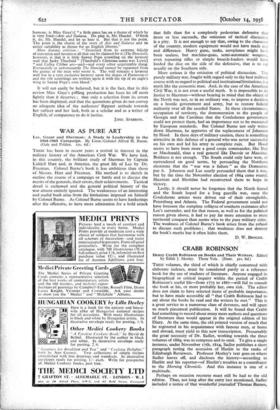WAR AS PURE ART
Tunas has been in recent years a revival in interest in the military history of the American Civil War. We have had, in this country, the brilliant study of Sherman by Captain Liddell Hart and, in America, the great life of Lee by Dr. Freeman. Colonel Bume's book is less ambitious than those of Messrs. Hart and Freeman. His method is to sketch- ih outline the course of a campaign or battle and to discuss the merits of the generals, their errors, their achievements. Tactical detail is eschewed and the general political history of the war almost entirely ignored. The weaknesses of an interesting and useful book arise from the limitations imposed on himself by Colonel Burne. As Colonel Burne seems to have hankerings after the offensive, to have more admiration for a bold attack that fails than for- a completely pedestrian defensive that more or less succeeds, the omission of- tactical discussion is a pity. It is not enough to say that, owing to the character Of the country, modern equipment would not have made any real difference. Heavy guns,. tanks, aeroplanes might have been useless, but machine-guns, semi-automatic weapons, even repeating rifles or simple breech-loaders would have loaded the dice on the side of the defensive, that is to say usually on the Southern side.
More serious is the omission of political discussion. The purely military war, fought with regard only to the best military course with no regard to political and institutional limitations, is a myth like the economic man. Azad, in the case of the American Civil War, it is not even a useful myth. It is impossible to do justice to Sherman—without bearing in mind that the object of the North was not, as in an ordinary war, to impose a decision on a hostile government and army, but to restore federal authority over all the seceded States. In these circumstances, occupation of territory, the demonstration to the people of Georgia and the Carolinas that the Confederate government could not protect them, had an importance not to be measured by European standards. But Colonel Burne not only writes down Sherman, he approves of the replacement of Johnston by Hood. In these days of military caution, there is something attractive in this defence of a general who was never successful on his own and led his army to complete ruin. But Hood seems to have been more a good corps commander, like Ney or Macdonald, than a real general like Davoilt or Massena. Boldness is not enough. The South could only have won, or surrendered on good terms, by persuading the Northern electorate that the " war was a failure " as the Democrats put it. Johnston and Lee nearly persuaded them that it was, but by the time the November election of 1864 came round, Sherman and Sheridan had reconverted them to hope in victory.
Lastly, it should never be forgotten that the North feared and the South hoped for a long guerilla .war, once the Confederate armies were driven out of their strongholds, Petersburg and Atlanta. The Federal government could not have foreseen the complete collapse of southern resistance after Lee's surrender, and for that reason, as well as for the political reason given above, it had to pay far more attention to mere territorial ainquest than seems wise to the pure military critic. The weakness of Colonel Burne's book arises from the refusal to discuss such problems ; that weakness does not destroy the book's merits but it often hides them.


















































 Previous page
Previous page